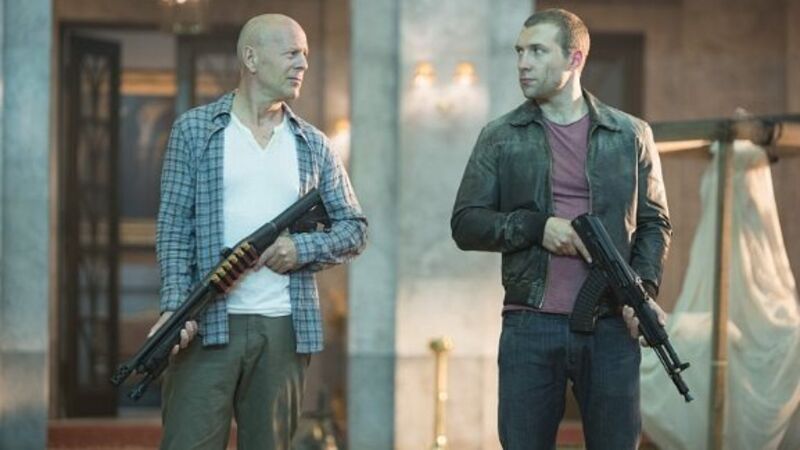Movie reviews: A Good Day To Die Hard

Die Hard 5 continues down this more fantastical route, with the result that it could easily be confused with any shoot-’em-up Euro action thriller of recent years. What will please action fans is that director John Moore (by box office returns, the most successful Irish director of all time) gets down to business very quickly: Willis isn’t five minutes in the Russian capital before he’s crashing through heavy Moscow traffic in a stolen truck in pursuit of an armoured car that’s chasing a van driven by his estranged son Jack (Jai Courtenay). Jack’s breaking a political prisoner (Sebastian Koch) out of the country, and the last thing he needs is for dad to show up to ruin his escape plan/life. Or is it? When Koch is taken hostage the McClane boys are forced to put aside their differences to punch/shoot/blow up the common enemy. It’s an impressive opening chase sequence. It’s so good, in fact, that everything that follows pales in comparison, and especially the humdrum Chernobyl-set CGI-laden finale. After a détente of 20 years, Hollywood has Ivan in the bad guy role — Muscly Mean Sidekick #456 boasts a CCCP tattoo and ‘nukes’ gets an outing — but there’s no one to match the charisma of Die Hard’s Alan Rickman. Or even Die Harder’s William Sadler.
Debbie (Leslie Mann) and Pete (Paul Rudd) were a bickering couple in the background of Knocked Up (2007), which was written and directed by Judd Apatow, but This Is 40 (15A), a sequel-of-sorts, puts Debbie and Pete centre-stage. We catch up with the pair at a particularly trying juncture in their marriage, when they are to celebrate their 40th birthdays within days of one another. Mind you, ‘celebrate’ is probably overstating the case. With his record company struggling, Pete is experiencing financial pressures that are squeezing all the fun out of life; in her attempts to persuade Paul to act responsibly, Debbie finds herself playing the hated role of the henpecking wife. Meanwhile, their daughters, Sadie and Charlotte (Maude and Iris Apatow), grow more demanding by the day. Apatow, who previously directed The 40-Year Old Virgin (2007) and Funny People (2009), offers a less abrasive story this time out, as the tale progresses via loosely crafted (and apparently ad-libbed) domestic spats before finally escalating into a full-blown marital crisis. The criticisms that have been levelled at Apatow in the past that his comedies are too digressive, and suffer for the want of a firm hand in the editing suite — can be applied here, but it’s also true that Pete and Debbie make for an endearingly normal married couple. Perhaps it’s the fact that Apatow is directing his wife and children, but once you get past the blackly comic flourishes there’s something very empathic and even touching about how the family is presented in a warts-and-all way — one minute they’re all supportive and loving, the next they’re bawling one another out. The consequences of Deb and Pete’s actions are hardly earth-shaking, but This Is 40 represents another yet twist in Apatow’s interesting series of films about the kind of characters who rarely get screen-time in Hollywood.











